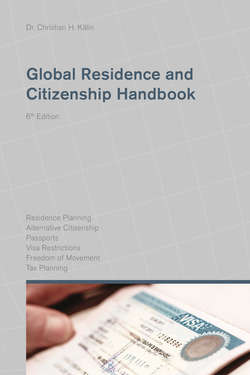Читать книгу Global Residence and Citizenship Handbook - Christian H. Kälin - Страница 16
На сайте Литреса книга снята с продажи.
1.2Residence and domicile
ОглавлениеThe concepts of residence and domicile have far-reaching effects on a person’s private life as they concern issues like marriage status, inheritance position in terms of applicable law and taxation, and tax status.
Residence simply refers to living in a particular place. Often expatriates who have moved to another country for work for a period of time are considered resident in that country. This is usually referred as habitual residence.
Domicile is an important concept in many countries where the legal system is based on the tradition of Anglo-Saxon common law. Domicile means to live in a place with the intention to make the place a fixed and permanent home – the person’s ‘real’ home. Domicile is distinct from nationality or citizenship, although a person’s nationality or citizenship may be a determining factor, too. A person can only have one domicile at any time, and the domicile may be a different place from the place of residence.
Ordinarily the country in which a person is domiciled will govern how the individuals’ property is dealt with i.e. in case of divorce or upon death. It is imperative to determine one’s status, especially if the person has more than one place of residence in different countries.
An individual will usually acquire the domicile of their parents, usually the father, at the time of birth. This will be the domicile of origin. Such can be changed to domicile of choice by taking up permanent residence in another country, with no intention of returning to the country of origin. However, an individual may still be considered domiciled in their previous country of residence and the country of domicile of origin, regardless of whether they have become resident in another country – this can have devastating effects, for example, on inheritance tax. Thus, there have been many cases where individual taxpayers left the UK years ago and lived abroad, were resident there continuously until their death, but their domicile was still considered the UK and therefore their estate became subject to UK inheritance tax.
Given that many people move from one country to another, it is essential to have a means of establishing which system of law applies to their situation, as each jurisdiction will have a different effect on their civil status (such as marriage and divorce) and some aspects of their property (such as applicable matrimonial property regimes and inheritance laws and taxation).
Although domicile is used as the fundamental connecting factor in the UK and most Commonwealth countries; in Brazil, Denmark, Ireland, Norway, the US and others, different connecting factors, and in particular habitual residence, are preferred.
Habitual residence, a concept used also in international (income) tax treaties based on the OECD (Organization for Economic Cooperation and Development) model treaty, is the generally accepted main factor to determine a person’s tax residence, at least for income tax purposes, but also in many other cases and increasingly so for inheritance tax purposes. Critics argue that the connection is not strong enough to give sufficient weight to the individuals’ civil rights and affairs in any given country, i.e. habitual residence as a concept can be problematic where a person is working or living abroad for a longer but essentially temporary period of time.
